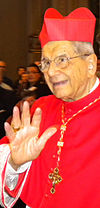Giovanni Coppa
|
His Eminence Giovanni Coppa |
|
|---|---|
| Cardinal-Deacon of San Lino | |

Cardinal Coppa in 2012
|
|
| Orders | |
| Ordination | 2 January 1949 |
| Consecration | 6 January 1980 by Pope John Paul II |
| Created Cardinal | 24 November 2007 by Pope Benedict XVI |
| Rank | Cardinal-Deacon |
| Personal details | |
| Born |
November 9, 1925 Alba, Italy |
| Died | 16 May 2016 (aged 90) |
| Nationality | Italian |
| Denomination | Roman Catholic |
| Previous post |
|
| Coat of arms |  |
|
Styles of Giovanni Coppa |
|
|---|---|
 |
|
| Reference style | His Eminence |
| Spoken style | Your Eminence |
| Informal style | Cardinal |
Giovanni Coppa (9 November 1925 – 16 May 2016) was an Italian Cardinal of the Roman Catholic Church. He served as a diplomat of the Holy See, and was elevated to the cardinalate in 2007.
Born in Alba, Giovanni Coppa attended the seminary there before studying at the Catholic University of the Sacred Heart in Milan, where he obtained his doctorate in modern letters (with a dissertation entitled: "The iconography of the Most Holy Trinity from the origins to the 14th century"). He was ordained to the priesthood on 2 January 1949, and then served as a diocesan delegate for the aspirants of Catholic Action. In 1952, he entered the Roman Curia in the Apostolic Chancery. Coppa became the director of the Rome-based monthly retreats of the nuns of the Holy Family of Spoleto in 1954, and began work in the Vatican Secretariat of State in 1958.
During the Second Vatican Council (1962–1965), Coppa served as an expert for the Latin language. He was named an honorary canon of the chapter of St. Peter's Basilica in 1965, and assessor of the Secretariat of State on 19 November 1975. He was also Vice-Chaplain of the Palatine Guard of Honor and responsible of the Conference of Saint Vincent of Paul. When the Association of Saints Peter and Paul was instituted at the Vatican, the Secretariat of State named Coppa as its counselor. He wrote several works on Saint Ambrose, the Gospels, and the Fathers of the Church, as well as contributing to works such as L'Osservatore Romano.
...
Wikipedia
